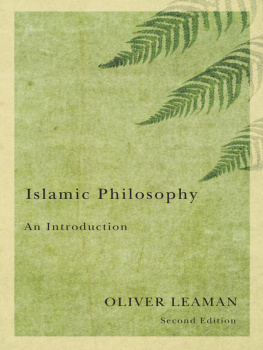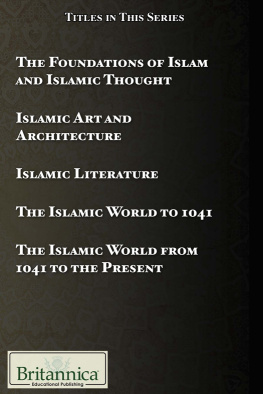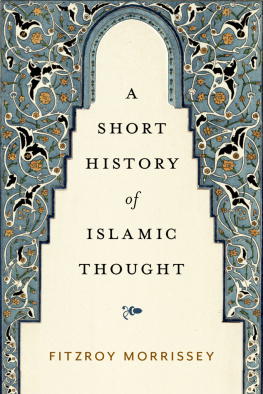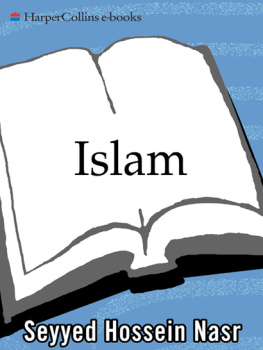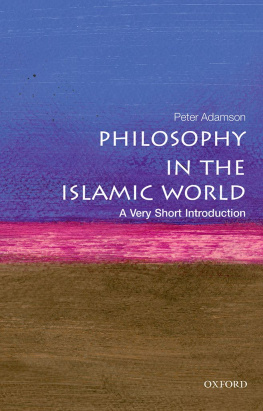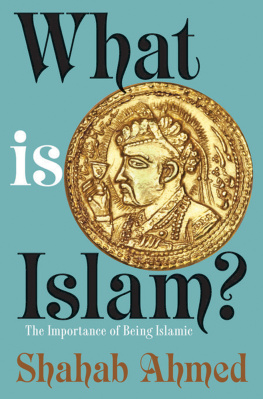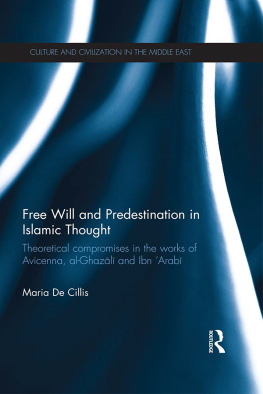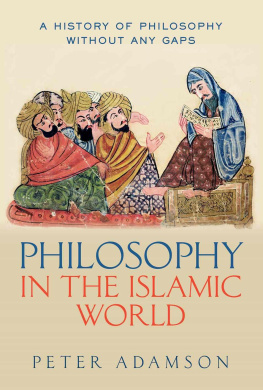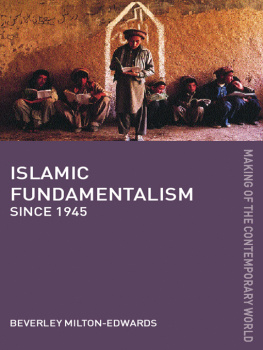Islamic Philosophy
Islamic Philosophy An Introduction
Oliver Leaman
Polity
Copyright Oliver Leaman 2009
The right of Oliver Leaman to be identified as Author of this Work has been asserted in accordance with the UK Copyright, Designs and Patents Act 1988.
First published in 2009 by Polity Press
Polity Press
65 Bridge Street
Cambridge CB2 1UR, UK
Polity Press
350 Main Street
Malden, MA 02148, USA
All rights reserved. Except for the quotation of short passages for the purpose of criticism and review, no part of this publication may be reproduced, stored in a retrieval system, or transmitted, in any form or by any means, electronic, mechanical, photocopying, recording or otherwise, without the prior permission of the publisher.
ISBN-13: 978-0-7456-5907-7
A catalogue record for this book is available from the British Library.
Typeset in 10.5 on 12 pt Sabon
by Servis Filmsetting Ltd, Stockport, Cheshire
Printed and bound by MPG Books Group, UK
The publisher has used its best endeavours to ensure that the URLs for external websites referred to in this book are correct and active at the time of going to press. However, the publisher has no responsibility for the websites and can make no guarantee that a site will remain live or that the content is or will remain appropriate.
Every effort has been made to trace all copyright holders, but if any have been inadvertently overlooked the publishers will be pleased to include any necessary credits in any subsequent reprint or edition.
For further information on Polity, visit our website: www.politybooks.com
Preface to the Second Edition
This is not the first introductory text which I have written on Islamic philosophy, which raises the obvious question of why there should be a need for another one, and by the same author. Whether, ultimately, this book has been worth the effort of writing and reading is of course something that the reader will have to decide; but from my point of view it has been worthwhile, because I have changed my ideas about some of the ways in which I formerly saw the main issues. In the past I had what seems to me now to be a rather narrow view of the discipline. I prioritized Islamic philosophy in the Peripatetic or Greek tradition, Islamic philosophy based on logic and the sort of analysis with which most philosophers in the Anglo-American world feel at home. I still think that this is the most important strain of Islamic philosophy; but I now think that the other two main schools the mystical, or Sufi, school and the illuminationist, or ishraqi, school produce interesting and important arguments that have to be assessed as parts of the whole enterprise. Ignoring these traditions does an injustice to the breadth of the enterprise of Islamic philosophy. In any case, very few of those writing within the Peripatetic tradition of falsafa restricted themselves to this type of writing; they merely saw it as playing a role in the rational understanding of our place in a world created by God not the only role, but just one role among many others. Moreover, these other roles, especially those of mysticism or illuminationist thought, are also important ways in which we can know who we are and how far we can understand what is above us. I think it is true of any general philosophical movement that we go awry if we concentrate merely on one aspect of it. In this book I present a more rounded and comprehensive guide to the topic than I could have in the past.
Another difference from some of my earlier work is that I now think that it is not so obvious who the heroes and the villains are or were. It is not uncommon to point to conservatives and progressives in the Islamic world, just as today we can divide Muslims into traditionalists and modernists. Although in the past I always thought that the quality of the arguments of the opponents of philosophy was high, I thought that the arguments of the defenders of philosophy were higher. Now I am not so sure. It seems to me that often those Muslim thinkers who seek to emphasize their faith at the expense of what they see as philosophy produce better philosophical arguments than do the defenders of philosophy. I think this brings out nicely the ways in which Islamic philosophy is really part and parcel of the general working-out of the implications of Islam itself, as a consequence of which any attempt at artificially segregating philosophy from faith is too one-dimensional to do justice to Islamic philosophy. On the other hand, I have written this book on the assumption that one does not need to be committed to any particular religion, or indeed any religion at all, to understand Islamic philosophy. Nor does one have to know much about Islam itself. I have kept the technical vocabulary to a minimum, and have tried to explain whatever cultural and religious details are important for an understanding of Islamic philosophy. I have also on occasion used Islamic philosophy to pursue controversies in the modern Islamic world, to bring to the attention of the reader the contemporary relevance and interest of the ideas and arguments discussed within Islamic philosophy. Because I presuppose no knowledge of either Islam or philosophy, I start with a brief history of Islamic philosophy that also introduces the reader to some of the basic concepts of Islam, and throughout the text ideas in Islam and philosophy are discussed together. There are omissions from the book that should be found in a more comprehensive account of the topic, of course; logic in particular is a notable absentee, but I did not feel that this was a particularly appropriate topic for the general reader. Logic aside, I hope I have included most of the main categories of Islamic philosophy, and have given sufficient bibliographical details for those interested in pursuing the subject further.
Despite what I hope is a more inclusive account of Islamic philosophy than hitherto, there is no doubt about whom I regard as the major thinker in the subject, and that is Ibn Rushd (Averroes). I make no excuse for my choice, and hope that in this eight-hundredth anniversary of his death the exceptional interest of his arguments will impress the reader. The difficult life of Ibn Rushd, who brought forth great theoretical works while suffering intermittent political disruption, reminds those of us who work in more comfortable conditions of the essentially radical nature of the philosophical enterprise when it confronts, or even tries to coexist with, tradition.
I have added a couple of new chapters and generally updated what remains, but the structure of the book is similar to the first edition, in that this is not primarily a historical introduction to the topic but is rather based on topics and issues, very much how I see Islamic philosophy as needing to be done. Not of course that there is anything wrong with history, but it can be very limiting in its attitude to its subject matter, when that subject matter consists of arguments and debates. One of the new chapters looks at some modern Islamic philosophers, and here I have only been able to discuss a few of the relevant thinkers. The other considers the frequent assertion that Islam needs an enlightenment, and missed out on it, since this is primarily a philosophical claim, although it is often given a political and theological direction.
Many of the arguments in this book were originally presented to various audiences in different countries, and I must thank all those who made comments on such occasions, who are too many to enumerate, and especially the students with whom I have been privileged to work. No one is to be held responsible for my views here, of course, except their author.
Oliver Leaman
Lexington, 2009
Authors Note and Abbreviations
Dates are generally given in this form: AH / CE . AH refers to the
Next page
